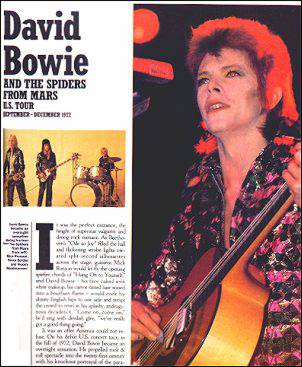 Companion
Companion![]() The
The  Companion
Companion
Home ¦ Index ¦ FAQ ¦ Encyclopaedia ¦ Timeline ¦ Songs ¦ Gallery ¦ E-mail

Rolling Stone Magazine Links to
Ziggy Stardust
Article Index
Rolling Stone Magazine (4 June 1987)
It was the perfect entrance, the height of superstar vulgarity and droog-rock menace. As Beethoven's "Ode to Joy" filled the hall and flickering strobe lights created split-second silhouettes across the stage, guitarist Mick Ronson would let fly the opening spitfire chords of "Hang Onto Yourself," and David Bowie - his face caked with white makeup, his carrot-tinted hair teased into a bouffant flame - would cock his skinny English hips to one side and tempt the crowd to revel in his splashy, androgynous decadence. "Come on, come on," he'd sing with devilish glee, "we've really got a good thing going."
It was an offer America could not refuse. On his debut US concert tour, in the fall of 1972, David Bowie became an overnight sensation. He propelled rock and roll spectacle into the twenty-first century with his knockout portrayal of the paranoid, megalomaniac rocker Ziggy Stardust and the glitz-rock blitz of his combo, the Spiders from Mars (Ronson, bassist Trevor Bolder, drummer Woody Woodmansey and pianist Mike Garson). With dramatic precision and violent, erotic charisma, Bowie transformed Ziggy into a sci-fi Elvis Presley with a Midnight Rambler mean streak - his act was living pop theater that embodied all of the music's sexual impulses and spiritual contradictions. Turning on the music hall charm in "Changes," foretelling Ziggy's bloody-demise in "Rock n Roll Suicide," performing mock fellatio on Mick Ronson's guitar during "The Width of A Circle", David Bowie busted the Seventies wide-open and his Ziggy Stardust revue and simultaneously ascended to superstardom, al in just twenty-two shows.
"It was like walking into the future," says DJ Rodney Bingenheimer, dean of the Hollywood rock-scene, recalling Bowie's two sellout shows on October 20th and 21st at the Santa Monica Civic Auditorium. "When that strobe light started going, it seemed like everything was black, white and silver - except for his red hair." According to Bingenheimer, when Bowie braked halfway through the show for a brief acoustic set featuring "Space Oddity" and a haunting performance of Jacque Brel's "My Death," people were stunned. "Everyone became real quiet," he says. "It was like seeing music from the future." Robert Hilburn, in his Los Angeles Times review of the Santa Monica spectacle, was no less gushing, hailing Bowie, as "a certified, genuine, guaranteed, blue-ribbon star."
David Bowie became an overnight sensation during his tour with the Spiders from Mars (from left):
Mick Ronson, Trevor Bolder and Woody Woodmansey.Actually, David Bowie was little more than a cult figure, an openly bisexual English pop singer with a strong critic's buzz, when he arrived in New York in mid-September aboard the Queen Elizabeth II. The Rise and Fall of Ziggy Stardust and The spiders From Mars had landed on the US charts upon its release the previous June, but the glowing reviews did not prepare American audiences for the Clockwork Orange rock n roll party Bowie took on the road that fall. As calculating as he was about career opportunities, Bowie was nonetheless taken aback by the sudden Ziggy fever that spread like wildfire across American soil, and later, the entire world.
The extent to which Ziggy had captured the imagination of pop fans really hit Bowie in Japan, where he and the Spiders played eight shows in the spring of 1973, following a second US Tour. "That was absolutely crazed," Bowie says, marveling still at the Japanese response. "Kids were all over the stage, throwing themselves off balconies and the security guards throwing them back into the audience." Three months later, on July 3rd, Bowie tried to put Ziggy to rest with a special retirement performance in London.
Ziggy, however refuses to die. Bowie's flamboyant incarnation of rock n roll bravado, sexual ambivalence and futuristic camp had influenced Glam-rock guerillas of the Seventies and Eighties, from the New York Dolls to the recent English sensation Sigue Sigue Sputnik. "I find it ironic to look at a band like Sigue Sigue Sputnik," Bowie says, "where it's so absolutely in the Ziggy court. All this time later, he'll still raise his brightly coloured head."
---This page last modified: 12 Dec 2018---